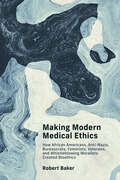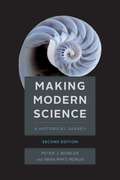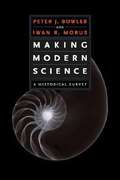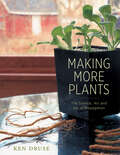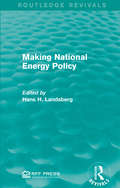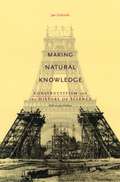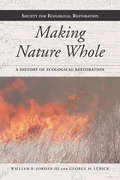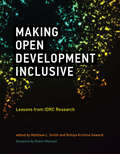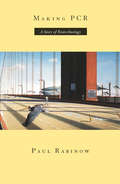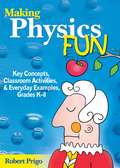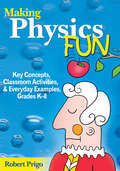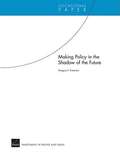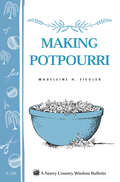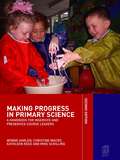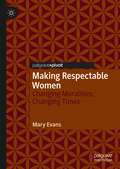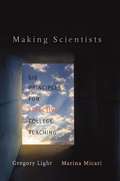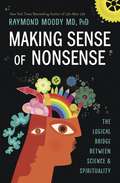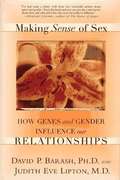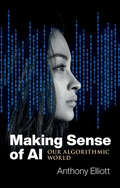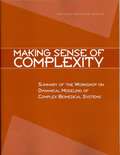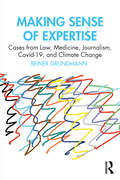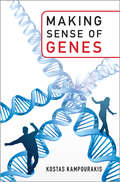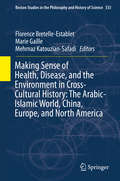- Table View
- List View
Making Modern Medical Ethics: How African Americans, Anti-Nazis, Bureaucrats, Feminists, Veterans, and Whistleblowing Moralists Created Bioethics (Basic Bioethics)
by Robert BakerThe little-known stories of the people responsible for what we know today as modern medical ethics.In Making Modern Medical Ethics, Robert Baker tells the counter history of the birth of bioethics, bringing to the fore the stories of the dissenters and whistleblowers who challenged the establishment. Drawing on his earlier work on moral revolutions and the history of medical ethics, Robert Baker traces the history of modern medical ethics and its bioethical turn to the moral insurrections incited by the many unsung dissenters and whistleblowers: African American civil rights leaders, Jewish Americans harboring Holocaust memories, feminists, women, and Anglo-American physicians and healthcare professionals who were veterans of the World Wars, the Cold War, and the Vietnam War.The standard narrative for bioethics typically emphasizes the morally disruptive medical technologies of the latter part of the twentieth century, such as the dialysis machine, the electroencephalograph, and the ventilator, as they created the need to reconsider traditional notions of medical ethics. Baker, however, tells a fresh narrative, one that has historically been neglected (e.g., the story of the medical veterans who founded an international medical organization to rescue medicine and biomedical research from the scandal of Nazi medicine), and also reveals the penalties that moral change agents paid (e.g., the stubborn bureaucrat who was demoted for her insistence on requiring and enforcing research subjects&’ informed consent). Analyzing major statements of modern medical ethics from the 1946–1947 Nuremberg Doctors Trials and Nuremberg Code to A Patient&’s Bill of Rights, Making Modern Medical Ethics is a winning history of just how respect and autonomy for patients and research subjects came to be codified.
Making Modern Science, Second Edition: A Historical Survey
by Peter J. Bowler Iwan Rhys MorusIn this new edition of the top-selling coursebook, seasoned historians Peter J. Bowler and Iwan Rhys Morus expand on their authoritative survey of how the development of science has shaped our world. Exploring both the history of science and its influence on modern thought, the authors chronicle the major developments in scientific thinking, from the revolutionary ideas of the seventeenth century to contemporary issues in genetics, physics, and more. Thoroughly revised and expanded, the second edition draws on the latest research and scholarship. It also contains two entirely new chapters: one that explores the impact of computing on the development of science, and another that shows how the West used science and technology as tools for geopolitical expansion. Designed for entry-level college courses and as a single-volume introduction for the general reader, Making Modern Science presents the history of science not as a series of names and dates, but as an interconnected and complex web of relationships joining science and society.
Making Modern Science, Second Edition: A Historical Survey
by Peter J. Bowler Iwan Rhys MorusIn this new edition of the top-selling coursebook, seasoned historians Peter J. Bowler and Iwan Rhys Morus expand on their authoritative survey of how the development of science has shaped our world. Exploring both the history of science and its influence on modern thought, the authors chronicle the major developments in scientific thinking, from the revolutionary ideas of the seventeenth century to contemporary issues in genetics, physics, and more. Thoroughly revised and expanded, the second edition draws on the latest research and scholarship. It also contains two entirely new chapters: one that explores the impact of computing on the development of science, and another that shows how the West used science and technology as tools for geopolitical expansion. Designed for entry-level college courses and as a single-volume introduction for the general reader, Making Modern Science presents the history of science not as a series of names and dates, but as an interconnected and complex web of relationships joining science and society.
Making Modern Science: A Historical Survey
by Peter J. Bowler Iwan R. MorusA textbook about the history of modern science with cross-references. The book is divided into two parts, one on episodes, the other on themes. It covers all major developments in scientific thinking--evolutionism, genetics, nuclear physics, and modern cosmology.
Making More Plants: The Science, Art, and Joy of Propagation
by Ken DruseA guide to propagation from the author of The New Shade Garden, with over 500 photographs: “My bible for rejuvenating plants.” —Anne Raver, The New York TimesFor people who love gardens, propagation—the practice of growing whatever you want, whenever you want—is gardening itself. In Making More Plants, one of America's foremost gardening authorities, presents innovative, practical techniques for expanding any plant collection, along with more than 500 photographs. Based on years of research, this is a practical manual as well as a beautiful garden book, presenting procedures Ken Druse has personally tested and adapted, as well as photographed step by step.“This is a book for all seasons, and will appeal to anyone intrigued by how plants grow.” —Virginia McClain Miller, Fine Gardening
Making National Energy Policy (Routledge Revivals)
by Hans H. LandsbergWhat we call the nation’s energy policy attempts to give direction to the production, use, transportation, and distribution of energy to help achieve an array of societal goals in the most compatible ways. In this title, originally published in 1993, noted analysts provide insight into complex policy issues of significant importance. Among the topics addressed are difficulties encountered in trying to fashion energy policy in the U.S. congress, the nature of energy policies and environmental polices, the challenges arising from regional conflict over energy policies, and the viability of deregulating electric power production. This collection of lectures is a valuable resource for students interested in environmental studies and public policy.
Making Natural Knowledge: Constructivism and the History of Science
by Jan GolinskiArguably the best available introduction to constructivism, a research paradigm that has dominated the history of science for the past forty years, Making Natural Knowledge reflects on the importance of this theory, tells the history of its rise to prominence, and traces its most important tensions. Viewing scientific knowledge as a product of human culture, Jan Golinski challenges the traditional trajectory of the history of science as steady and autonomous progress. In exploring topics such as the social identity of the scientist, the significance of places where science is practiced, and the roles played by language, instruments, and images, Making Natural Knowledge sheds new light on the relations between science and other cultural domains. "A standard introduction to historically minded scholars interested in the constructivist programme. In fact, it has been called the 'constructivist's bible' in many a conference corridor."—Matthew Eddy, British Journal for the History of Science
Making Nature Whole: A History of Ecological Restoration (Science Practice Ecological Restoration)
by William R. Jordan III George M. LubickMaking Nature Whole is a seminal volume that presents an in-depth history of the field of ecological restoration as it has developed in the United States over the last three decades. The authors draw from both published and unpublished sources, including archival materials and oral histories from early practitioners, to explore the development of the field and its importance to environmental management as well as to the larger environmental movement and our understanding of the world. Making Nature Whole is a landmark contribution, providing context and history regarding a distinctive form of land management and giving readers a fascinating overview of the development of the field. It is essential reading for anyone interested in understanding where ecological restoration came from or where it might be going.
Making Open Development Inclusive: Lessons from IDRC Research (International Development Research Centre)
by Matthew L. Smith and Ruhiya Kristine SewardDrawing on ten years of empirical work and research, analyses of how open development has played out in practice.A decade ago, a significant trend toward openness emerged in international development. "Open development" can describe initiatives as disparate as open government, open health data, open science, open education, and open innovation. The theory was that open systems related to data, science, and innovation would enable more inclusive processes of human development. This volume, drawing on ten years of empirical work and research, analyzes how open development has played out in practice.
Making PCR: A Story of Biotechnology
by Paul RabinowMaking PCR is the fascinating, behind-the-scenes account of the invention of one of the most significant biotech discoveries in our time—the polymerase chain reaction. Transforming the practice and potential of molecular biology, PCR extends scientists' ability to identify and manipulate genetic materials and accurately reproduces millions of copies of a given segment in a short period of time. It makes abundant what was once scarce—the genetic material required for experimentation.Making PCR explores the culture of biotechnology as it emerged at Certus Corporation during the 1980s and focuses on its distinctive configuration of scientific, technical, social, economic, political, and legal elements, each of which had its own separate trajectory over the preceding decade. The book contains interviews with the remarkable cast of characters who made PCR, including Kary Mullin, the maverick who received the Nobel prize for "discovering" it, as well as the team of young scientists and the company's business leaders. This book shows how a contingently assembled practice emerged, composed of distinctive subjects, the site where they worked, and the object they invented. "Paul Rabinow paints a . . . picture of the process of discovery in Making PCR: A Story of Biotechnology [and] teases out every possible detail. . . . Makes for an intriguing read that raises many questions about our understanding of the twisting process of discovery itself."—David Bradley, New Scientist "Rabinow's book belongs to a burgeoning genre: ethnographic studies of what scientists actually do in the lab. . . . A bold move."—Daniel Zalewski, Lingua Franca "[Making PCR is] exotic territory, biomedical research, explored. . . . Rabinow describes a dance: the immigration and repatriation of scientists to and from the academic and business worlds."—Nancy Maull, New York Times Book Review
Making Physics Fun
by Robert PrigoBoost student interest and understanding in the physical sciences!Teaching physical science in the elementary and middle grades can be challenging for busy teachers faced with growing demands and limited resources. Robert Prigo provides fun and engaging activities using safe, available materials that educators can easily incorporate into lesson plans. Extensive examples, sample inquiry questions, and ideas for initiating units are readily available for teachers to pick and choose from to meet student needs.The result of more than two decades of professional development work with hundreds of teachers and administrators, this resource addresses specific areas of physical science, including motion and force, waves and sound, light and electromagnetic waves, and more. Dozens of activities demonstrating physics in action help students of all ages relate physics principles to their everyday experiences.This practitioner-friendly resource helps teachers: Address the "big ideas" in K-8 science education Promote student understanding with ready-to-use learning experiences Use hands-on activities to help students make larger, real-world connections Assemble classroom learning centers to facilitate deeper understanding of basic physics principlesWith conceptual summaries to support teachers' proficiency and understanding of the content, this guidebook is ideal for bringing physics to life for students in the classroom and in their lives!
Making Physics Fun: Key Concepts, Classroom Activities, and Everyday Examples, Grades K-8
by Robert PrigoIn easy-to-understand language, this resource presents engaging, ready-to-use learning experiences that address the "big ideas" in K–8 science education and help students make larger, real-world connections.
Making Policy in the Shadow of the Future
by Gregory F. TrevertonThe National Intelligence Council's 2008 report "Global Trends 2025: A Transformed World" projects what the world will look like in 2025 based on recent trends. This paper asks: How should U.S. policy adapt now to account for these trends and the future that will result from them? The author explores such issues as climate change, defense, international relations, and the structure of the federal government.
Making Potpourri: Storey's Country Wisdom Bulletin A-130 (Storey Country Wisdom Bulletin Ser.)
by Madeleine H. SieglerSince 1973, Storey's Country Wisdom Bulletins have offered practical, hands-on instructions designed to help readers master dozens of country living skills quickly and easily. There are now more than 170 titles in this series, and their remarkable popularity reflects the common desire of country and city dwellers alike to cultivate personal independence in everyday life.
Making Progress in Primary Science: A Study Book for Teachers and Student Teachers
by Wynne Harlen Christine Macro Kathleen Reed Mike SchillingThis new and extensively revised edition of Progress in Primary Science is intended for all those involved in training teachers of primary school science, both preservice and on INSET courses. Its flexible modular structure enables course leaders to tailor their course to participants' needs. Each module can be studied individually or as part of an extended programme and contains notes for facilitators, photocopiable workshop materials, activities for practitioners and suggestions for further reading. Throughout the book the focus is on the learning of science as an investigative process through which pupils develop an understanding of ideas. This is supported by modules on different aspects of teaching and learning in science, including: building on children's own ideas how to ask and answer questions managing practical work in the classroom science for very young children effective assessment, self-assessment and feedback cross-curricular links ICT and science science outside the classroom. The companion study book currently available can be used by those participating on these courses. It follows the same modular structure and contains the same information as this book, and makes planning and delivering the course easier and less time consuming for the course leader.
Making Respectable Women: Changing Moralities, Changing Times
by Mary EvansThis book studies the ways in which the assessment of being or not being ‘respectable’ has been applied to women in the UK in the past one hundred and fifty years. Mary Evans shows how the term ‘respectable’ has changed and how, most importantly, the basis of the ways in which the respectability of women has been judged has shifted from a location in women’s personal, domestic and sexual behaviour to that of how women engage in contemporary forms of citizenship, not the least of which is paid work. This shift has important social and political implications that have seldom been explored: amongst these are the growing marginalisation of the validation of the traditional care work of women, the assumption that paid work is implicitly and inevitably empowering and the complex ways in which respectability and conformity to highly sexualised conventions about female appearance have been normalised. Making Respectable Women makes use of archive material to show how the changing definition of a moral and social concept can have an impact on both the behaviour and the choices of individuals and the operations of institutional power. It will be of interest to students and scholars across the humanities and social sciences.
Making Scientists
by Gregory Light Marina MicariGregory Light and Marina Micari reject the view that science, technology, engineering, and mathematics are elite disciplines restricted to a small number with innate talent. Rich in concrete advice, Making Scientists offers a new paradigm of how scientific subjects can be taught at the college level to underrepresented groups.
Making Sense Of Nonsense: The Logical Bridge Between Science And Spirituality
by Raymond MoodyWhat do the whimsical writings of Dr. Seuss have in common with near-death experiences? The answer is that nonsense writing and spiritual experiences seem to defy all logic and yet they both can make a powerful personal impact. In this book, New York Times bestselling author Dr. Raymond Moody shares the groundbreaking results of five decades of research into the philosophy of nonsense, revealing dynamic new perspectives on language, logic, and the mystical side of life. Explore the meaningful feelings that accompany nonsense language and learn how engaging with nonsense can help you on your own spiritual path. Discover how nonsense transcends classical logic, opening the doorway to new spiritual and philosophical breakthroughs. With dozens of examples from literature, comedy, music, and the history of religion, this book presents a unique new approach to the mysteries of the human spirit.
Making Sense Of Sex: How Genes And Gender Influence Our Relationships
by David P. Barash Judith Eve LiptonWhy do most women prefer romance, and men, sex? Why do women live longer than men? Why are men willing to pay for sex while women almost never are? Why are women nearly always the primary caregivers of young children? What happens when a man's brain is trapped in a woman's body? When is a short, balding middle-aged man more attractive than a tall, handsome, young one? In Making Sense of Sex, the husband-and-wife team of David Barash, an evolutionary biologist, and Judith Lipton, a clinical psychiatrist, draw on their respective areas of expertise to explore and explain the central fact of our existence -- that men and women are fundamentally, unalterably different. They present an eye-opening and wide-ranging consideration of what those differences are, how they came to be, why they are important, and what they mean in our everyday lives. The authors integrate biological and anthropological findings with real-life stories of indviduals to address the conundrums that surround male-female behavior and relationships. Drawing on the latest research in evolutionary biology, they trace the multifaceted gender gap to the basic, defining difference between males and females: that one makes sperm, the other, eggs. They show how that distinction explains why women and men differ in essential ways, exploring such questions as: Why are men more attracted than women to pornography, group sex, and one-night stands? Why are women the "gatekeepers" of sex? Why do women have orgasms?Making Sense of Sex is a highly informative and entertaining look at human relationships. The book will help readers not only to better understand themselves, but to better understand their children, their relatives, and their lovers with whom they share so much yet find so infuriatingly and fascinatingly different.
Making Sense in Common: A Reading of Whitehead in Times of Collapse (Posthumanities)
by Isabelle StengersA leading philosopher seeks to recover &“common sense&” as a meeting place to reconcile science and philosophy With her previous books on Alfred North Whitehead, Isabelle Stengers not only secured a reputation as one of the premier philosophers of our times but also inspired a rethinking of critical theory, political thought, and radical philosophy across a range of disciplines. Here, Stengers unveils what might well be seen as her definitive reading of Whitehead.Making Sense in Common will be greeted eagerly by the growing group of scholars who use Stengers&’s work on Whitehead as a model for how to think with conceptual precision through diverse domains of inquiry: environmentalism and ecology, animal studies, media and technology studies, the history and philosophy of science, feminism, and capitalism. On the other hand, the significance of this new book extends beyond Whitehead. Instead, it lies in Stengers&’s recovery of the idea of &“common sense&” as a meeting place—a commons—where opposed ideas of science and humanistic inquiry can engage one another and help to move society forward. Her reconciliation of science and philosophy is especially urgent today—when climate disaster looms all around us, when the values of what we thought of as civilization and modernity are discredited, and when expertise of any kind is under attack.
Making Sense of AI: Our Algorithmic World
by Anthony ElliottIndustrial robots, self-driving cars, customer-service chatbots and Google’s algorithmic predictions have brought the topic of artificial intelligence into public debate. Why is AI the source of such intense controversy and what are its economic, political, social and cultural consequences? Tracing the changing fortunes of artificial intelligence, Elliott develops a systematic account of how automated intelligent machines impact different spheres and aspects of public and private life. Among the issues discussed are the automation of workforces, surveillance capitalism, warfare and lethal autonomous weapons, the spread of racist robots and the automation of social inequalities. Elliott also considers the decisive role of AI in confronting global risks and social futures, including global pandemics such as COVID-19, and how smart algorithms are impacting the search for energy security and combating climate change. Making Sense of AI provides a judiciously comprehensive account of artificial intelligence for those with little or no previous knowledge of the topic. It will be an invaluable book both for students in the social sciences and humanities and for general readers.
Making Sense of Complexity: Summary of the Workshop on Dynamical Modeling of Complex Biomedical Systems
by George CasellaSummary of the Workshop on Dynamical Modeling of Complex Biomedical Systems
Making Sense of Expertise: Cases from Law, Medicine, Journalism, Covid-19, and Climate Change
by Reiner GrundmannCurrent debates about experts are often polarized and based on mistaken assumptions, with expertise either defended or denigrated. Making Sense of Expertise instead proposes a conceptual framework for the study of expertise in order to facilitate a more nuanced understanding of the role of expertise in contemporary society. Too often different meanings of experts and expertise are implied without making them explicit. Grundmann’s approach to expertise is based on a synthesis of approaches that exist in various fields of knowledge. The book aims at dispelling much of the confusion by offering a comprehensive and rigorous framework for the study of expertise. A series of in-depth case studies drawn from contemporary issues, including the climate crisis and the COVID-19 pandemic, provide the empirical basis of the author’s comprehensive approach. This thought-provoking book will be of great interests to students, instructors and researchers in a range of fields in the humanities, social sciences, and science and technology studies.
Making Sense of Genes
by Kostas KampourakisWhat are genes? What do genes do? These seemingly simple questions are in fact challenging to answer accurately. As a result, there are widespread misunderstandings and over-simplistic answers, which lead to common conceptions widely portrayed in the media, such as the existence of a gene 'for' a particular characteristic or disease. In reality, the DNA we inherit interacts continuously with the environment and functions differently as we age. What our parents hand down to us is just the beginning of our life story. This comprehensive book analyses and explains the gene concept, combining philosophical, historical, psychological and educational perspectives with current research in genetics and genomics. It summarises what we currently know and do not know about genes and the potential impact of genetics on all our lives. Making Sense of Genes is an accessible but rigorous introduction to contemporary genetics concepts for non-experts, undergraduate students, teachers and healthcare professionals.
Making Sense of Health, Disease, and the Environment in Cross-Cultural History: The Arabic-Islamic World, China, Europe, and North America (Boston Studies in the Philosophy and History of Science #333)
by Florence Bretelle-Establet Mehrnaz Katouzian-Safadi Marie GailleThis book has been defined around three important issues: the first sheds light on how people, in various philosophical, religious, and political contexts, understand the natural environment, and how the relationship between the environment and the body is perceived; the second focuses on the perceptions that a particular natural environment is good or bad for human health and examines the reasons behind such characterizations ; the third examines the promotion, in history, of specific practices to take advantage of the health benefits, or avoid the harm, caused by certain environments and also efforts made to change environments supposed to be harmful to human health. The feeling and/or the observation that the natural environment can have effects on human health have been, and are still commonly shared throughout the world. This led us to raise the issue of the links observed and believed to exist between human beings and the natural environment in a broad chronological and geographical framework. In this investigation, we bring the reader from ancient and late imperial China to the medieval Arab world up to medieval, modern, and contemporary Europe. This book does not examine these relationships through the prism of the knowledge of our modern contemporary European experience, which, still too often, leads to the feeling of totally different worlds. Rather, it questions protagonists who, in different times and in different places, have reflected, on their own terms, on the links between environment and health and tries to obtain a better understanding of why these links took the form they did in these precise contexts. This book targets an academic readership as well as an “informed audience”, for whom present issues of environment and health can be nourished by the reflections of the past.
